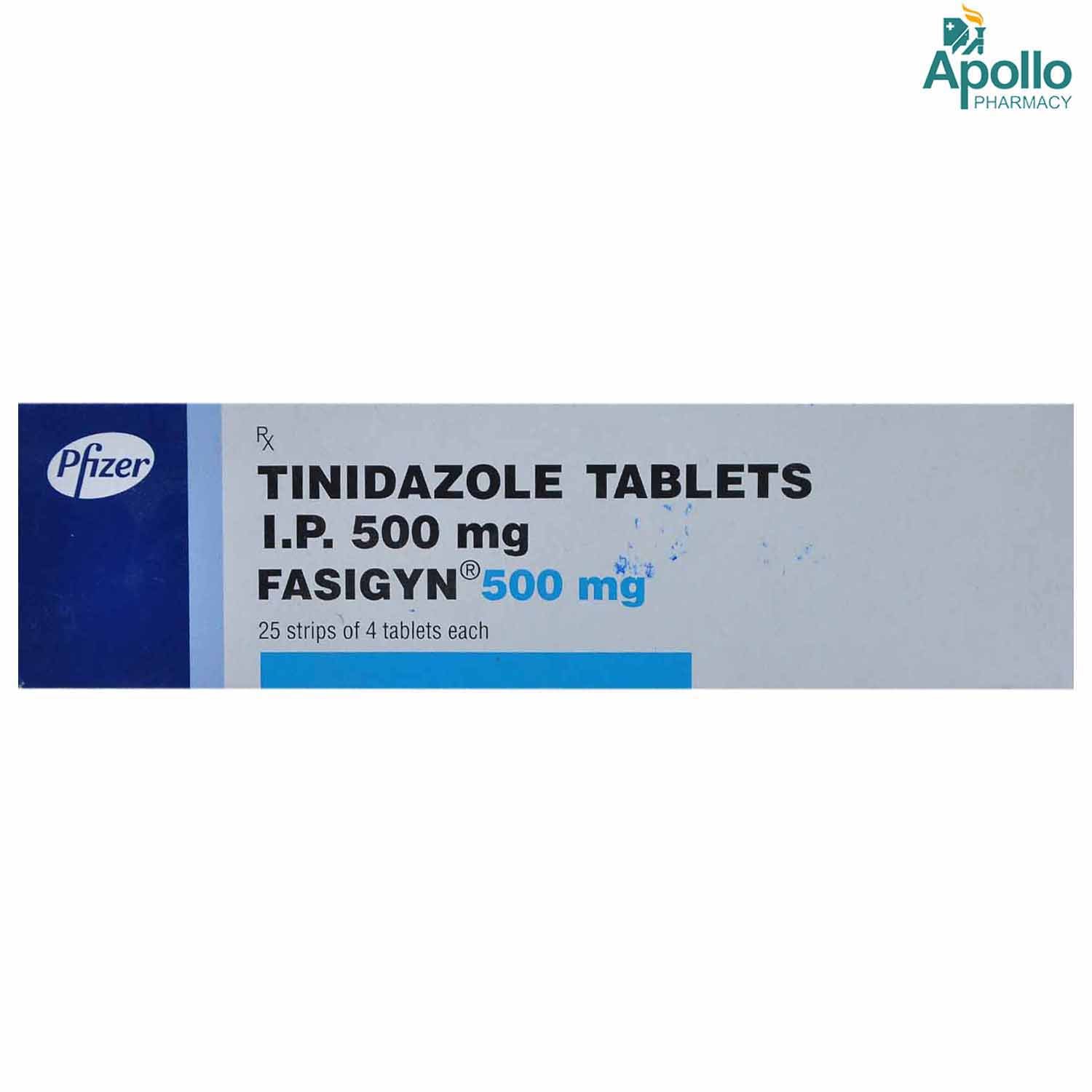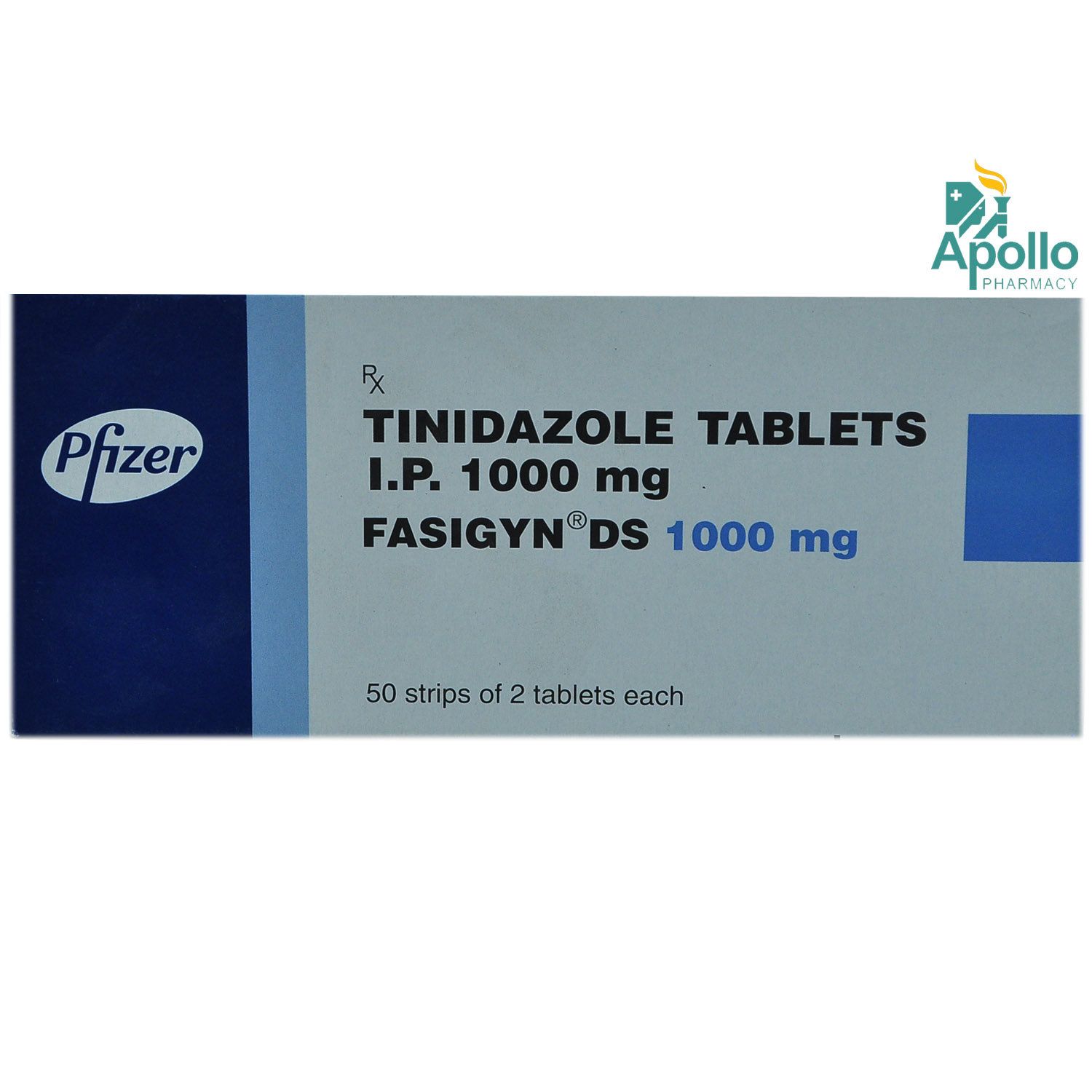Tinidazole
About Tinidazole
Tinidazole belongs to a class of antibacterial medications called 'nitroimidazoles', which kill infection-causing germs, mainly protozoans & bacteria. Tinidazole is used to cure certain infections caused by microbes, especially bacteria/Protozoa, such as infection of the intestines or vagina. It is also used to treat certain sexually transmitted infections. Microbes are minute living creatures that can cause harmful effects on human beings when they enter our bodies. They induce damage by producing harmful chemicals called toxins or multiply inside healthy cells leading to their death in the process. Tinidazole does not work against infections caused by the virus, including cold and flu.
Tinidazole is selectively harmful to germs that don't require oxygen to survive, especially protozoa and bacteria. Tinidazole kills microbes by entering their cells and generating harmful molecules that damage germ's DNA (Protozoans & bacteria) & hence kill them.
The dose and duration of Tinidazole can vary depending on your condition and the severity of the infection. In some cases, you may experience common side effects such as nausea, vomiting, loss of appetite, dizziness, tremors and headaches. Most of these side effects do not require medical attention and will resolve gradually over time. However, you are advised to talk to your doctor if you experience these side effects persistently.
Before starting Tinidazole, please inform your doctor if you have any allergies (against these antibiotics) or kidney or liver problems. Do not take Tinidazole on your own, as self-medication may lead to antibiotic resistance in which antibiotics fail to act against specific bacterial infections. Consult your doctor before taking Tinidazole if you are pregnant or breastfeeding. Avoid alcohol consumption while taking Tinidazole as it may cause increased dizziness. Tinidazole may cause dizziness and vision problems, so be cautious while driving. Tinidazole is not recommended for use in children.
Uses of Tinidazole
Medicinal Benefits
Tinidazole is used to treat patients with certain vaginal, urinary, or intestinal infections or other infections in the body. These infections may be caused by anaerobic bacteria (bacteria that do not use oxygen) or amoeba. Tinidazole kills infection-causing microbes by producing harmful chemicals inside their cells, causing DNA damage and hence killing them.
Directions for Use
Storage
Side Effects of Tinidazole
- Sleepiness/tiredness
- Headache
- Nausea and/or vomiting
- Dizziness or vertigo (a spinning sensation)
- Tremor
- Taste disturbances
- Skin reactions
- Numbness or tingling in your fingers or toes
Drug Warnings
Do not take Tinidazole if you are allergic to imidazole drugs. Consult your doctor immediately if you experience tendon pain, swelling or inflammation while taking Tinidazole. Talk to your doctor before taking Tinidazole if you have epilepsy, low levels of potassium, nervous or muscle problems, head injury or brain tumour, diabetes, rheumatoid arthritis, heart, kidney or liver problems. Consult your doctor before taking Tinidazole if you are pregnant or breastfeeding. Avoid alcohol consumption while taking Tinidazole as it causes increased dizziness. Tinidazole may cause dizziness and vision problems, so be cautious while driving. Tinidazole is not recommended for use in children unless recommended by a doctor. If you are due to have an operation or dental treatment, please tell the person carrying out the treatment which medicines you are taking.
Drug Interactions
Drug-Drug Interactions: Tinidazole may interact with HIV medications (e.g. amprenavir), antifungal medication (e.g. clotrimazole, itraconazole, ketoconazole, voriconazole), heart or blood pressure medication (e.g. diltiazem, felodipine, nifedipine, verapamil), seizure medication (e.g. carbamazepine, felbamate, oxcarbazepine, phenobarbital, phenytoin, primidone) and live vaccines (e.g. cholera, typhoid, BCG).
Food-Drug Interactions: Tinidazole is not to be taken with alcohol, causing flushing, abdominal cramps, vomiting, and rapid heartbeat.
Drug-Disease Interactions: Tinidazole may interact with disease conditions, including Bone Marrow Depression/Low Blood Counts, neurologic toxicity, and liver diseases.
Drug-Drug Interactions Checker List:
Safety Advice

Alcohol
unsafeTinidazole is not recommended with alcohol. Taking alcohol or using preparations that contain alcohol may result in irregular heartbeat, rapid heartbeat, low blood pressure, throbbing in the head and neck, sweating, nausea and vomiting.

Pregnancy
unsafeTinidazole is not prescribed in pregnant patients. Use is contraindicated during the first trimester of pregnancy. This drug should be used only under strict medical supervision or under doctors' consultation only.

Breast Feeding
cautionTinidazole is not prescribed in breastfeeding mothers. There are no adequate studies on women to determine infant risk when using this medication during breastfeeding. A doctor's consultation is required before taking this drug in breastfeeding mothers.

Driving
unsafeTinidazole is not recommended before driving. It may cause drowsiness or dizziness, do not drive a car or operate machinery while taking Tinidazole.

Liver
cautionTinidazole has been found to interact with the liver's functioning and increase liver-associated enzymes in the blood, thus, caution is to be taken & doctor's consultation is recommended. Due to these interactions, Tinidazole is usually prescribed for a short period of time.

Kidney
cautionNo harmful interaction and effect on kidneys have been reported between Tinidazole and kidney patients. Dose adjustments are required in elderly patients. The patient is advised to consult a doctor before taking Tinidazole.

Children
cautionDose adjustment is made according to age, weight and severity of the infection.
Habit Forming
Diet & Lifestyle Advise
- It would be best to take probiotics after taking the full course of Tinidazole to restore some healthy bacteria in the intestine that may have been killed. Taking probiotics after antibiotic treatment can reduce the risk of antibiotic-associated diarrhoea. Certain fermented foods like yoghurt, cheese, sauerkraut and kimchi can help restore the intestine's good bacteria.
- Include more fibre-enriched food in your diet, as it can be easily digested by gut bacteria which helps stimulate their growth. Thus fibre foods may help restore healthy gut bacteria after taking a course of antibiotics. Whole grains, like whole-grain bread, and brown rice, should be included in your diet.
- Avoid taking too much calcium-enriched foods and drinks as it might affect the working of Tinidazole.
- Avoid intake of alcoholic beverages with Tinidazole as it can make you dehydrated and affect your sleep. This can make it harder for your body to aid the Tinidazole in fighting off infections.
Special Advise
- If a patient needs to take Tinidazole for longer than ten days, the doctor will want him to do some tests. The patient should make sure to keep any appointments that the doctor holds.
Patients Concern
Disease/Condition Glossary
Bacterial/Protozoal infection is a condition in which harmful bacteria/protozoa enter, multiply and infect the body. They can target any part of the body and multiply very quickly. These infections vary from minor illnesses like sore throat and ear infections to severe brain, liver & intestinal infections like meningitis, encephalitis or colitis. When you get infected with these germs, you can experience generalized symptoms, like fevers, chills and fatigue. Few harmful bacteria that commonly cause infections include Streptococcus, Staphylococcus and E. coli, whereas few harmful protozoa include amoeba, giardia etc. Anyone can get a bacterial/protozoal infection, but people with a weak immune system or taking immunosuppressive medicines like steroids are more prone to infections.
FAQs
Tinidazole is used to treat patients with certain vaginal, urinary, or intestinal infections or other bodily infections. These infections may be caused by anaerobic bacteria (bacteria that do not use oxygen) or amoeba. Tinidazole kills infection-causing microbes by producing harmful chemicals inside their cells, causing DNA damage and hence killing them.
Do not consume alcohol or alcohol-based products while taking Tinidazole and at least 3 days after your treatment commences. You may experience unpleasant side effects such as fast heartbeats, nausea, vomiting, sweating and tingling under your skin.
Tinidazole and aspirin are contraindicated in patients and hence are strictly not advised to take together. Before taking Tinidazole, a patient must consult with a doctor about the already prescribed aspirin.
Not recommended. A patient who is already taking medication for mania treatment by drugs like lithium is strictly prohibited from taking Tinidazole as it may result in harmful mental implications. A patient is requested to consult with the doctor and take the respective measures.
Not recommended. A patient with a transplanted kidney might be taking an immunosuppressive drug like cyclosporin which is contraindicated with Tinidazole failing the efficacy of the Immnosuppresant drug. There are chances of rejection of the transplanted kidney in the patient and, hence, not recommended to take Tinidazole without doctor's consultation.
Take the missed dose as soon as possible. Patients are advised not to take a double dose to compensate for the missed dose. Skip the missed dose if it is almost time for your next scheduled dose.





